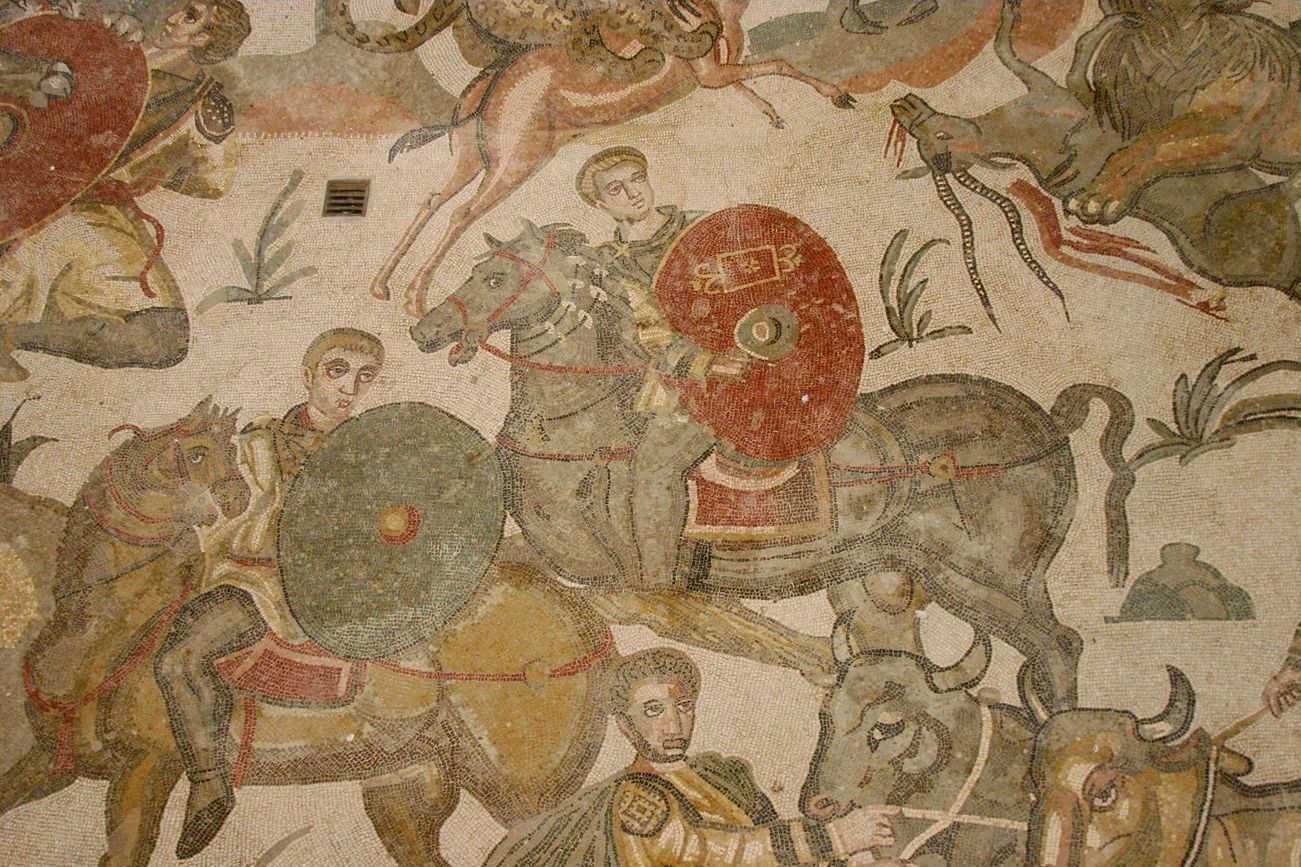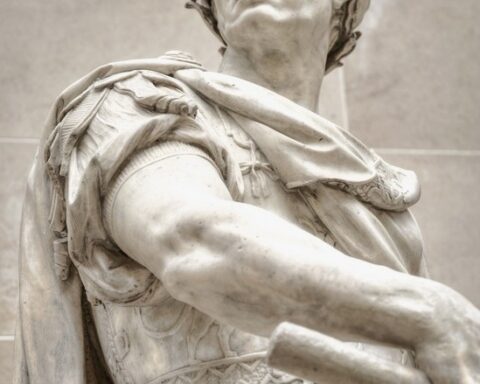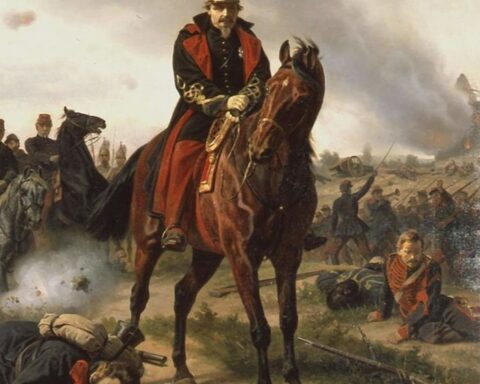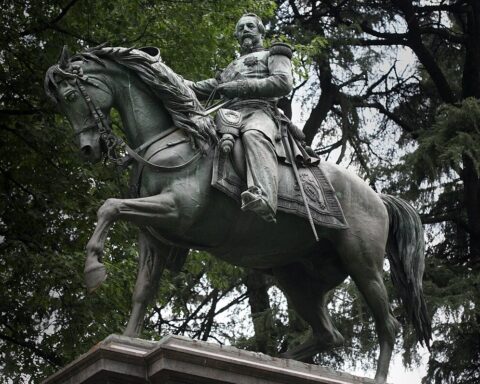Editor’s note: The following is extracted from Studies in History and Politics, by Herbert Fisher (published 1920).
A stern and melancholy interest, hardly to be matched in any other epoch, attaches to the records of the Roman Empire in the fourth century of our era. The old world was passing away in storm and agony, its frontiers assailed, its creeds challenged and perplexed, its social tissue suffering a slow and steady process of degeneration, which the political science of that time might note but was impotent to analyse or to cure. It was an age of bitter factions, when the demise of an emperor gave the signal for turmoil, intrigue, or civil war; when, even within the Christian circle, sect contended with sect in savage and unrelenting animosity, and great political interests were often sacrificed to the vile machinations of the palace. And meanwhile the Empire was assaulted on all sides, by the Persians in Mesopotamia, by the Goths in Thrace, by the Germans on the Gaulish frontier—a contest waged with varying fortunes and exhibiting abundant proof that the legions of Rome had lost neither the discipline nor the coolness of their ancient renown, but nevertheless revealing to the understanding eye the ominous spectacle of a weakening defence against an ever-growing momentum of attack.
This, too, is the century which witnessed the codification of the orthodox creed of the Western Church and the expiring effort of paganism to maintain itself as the official religion of the Western world. In the brief reign of Julian, which occupies a disproportionate space in Gibbon’s majestic work and is therefore to Englishmen the most familiar episode of later Roman history, the contest between the Christian religion and a sublimated form of the older beliefs is shown against the sombre background of the German and the Persian wars. The pagan Emperor, fighting against overwhelming spiritual and material forces, dies after a reign of less than two years; and the wheel of fortune swings suddenly round. The worship of the Sun-god is discarded; the Nicene Creed expels the brief and enlightened catechism of the pagan Sallustius; and by the end of the century the official triumph of Christianity is secure.
For twenty-five years of this tormented age we may follow the guidance of a writer who, though standing outside the Christian fold, was so temperate in spirit and so honourably distinguished for judgement and impartiality that critics have been divided as to the exact shade of his religious opinions. The History of Ammianus Marcellinus begins for us (for the earlier books have been lost) in 353 and ends with the defeat and death of Valens at Adrianople in 378, recounting in whole or in part the reigns of seven Emperors, Constantius, Julian, Jovian, Valens, Valentinian I, Gratian, and the child Valentinian II. But the original work, which was designed as a continuation of the histories of Tacitus, went back to the death of Nerva (A.D. 96), so that the accident of literary survival has preserved to us, perhaps fortunately for his reputation, only so much of the history as concerns the period of the author’s active participation in the public affairs of the Empire. We have no external evidence as to the character of the lost books of Ammianus. Probably Gibbon is right in assuming that the first thirteen books were but ‘a superficial epitome of two hundred and fifty-seven years’. It has, however, been argued, from references to the earlier books contained in the surviving fragments and seeming to imply a full treatment of certain topics, that the history was written upon a uniform scale, and that it contained some eighty books, thirty-one of which were devoted to the period with respect to which Ammianus was able to employ ocular and oral testimony. This, however, is an hypothesis entirely unsupported by literary tradition; and, since Ammianus exhibits scant regard to proportion in those parts of his work which we are enabled to test, we need not be at pains to defend the symmetry of his general design.
The last of the Latin historians was a soldier of Greek speech and lineage who was born about A.D. 332 in the half-Greek, half-Syrian city of Antioch. That Ammianus spoke Greek as his native tongue would be a natural inference from his birthplace, even if Greek modes of speech and thought were not plentifully illustrated in his writings. And it may give matter for surprise that, having been suckled in the speech of Herodotus and Thucydides, Ammianus should have staked his literary reputation upon a work written in a foreign language, over which he never succeeded in obtaining an easy and graceful mastery. Language is a delicate and intricate thing, so delicate and so intricate that only a man with a rare genius for style can hope to win complete purity of expression in a foreign tongue; and, though the gifts of Ammianus were numerous and solid, a sense of style in writing was not among them. He wrote Latin, then, not out of an artistic impulse to practise himself in a new and difficult mode, but because Latin was the official language of the Empire, because it was spoken in the armies and the public offices, because it was the instrument of a public career, and because, through the use of a long line of poets, historians, philosophers, and legists, Latin might be regarded as the authentic voice of Roman patriotism itself.
Indeed it is curious to reflect upon the singular power and magnetism which the name and tradition of Rome were still able to exert over the mind of a provincial and critical Greek, some of whose most famous pages are devoted to a delineation of the vices of the Roman capital, to the defeat of Roman armies in Persia and in Thrace, and to the acceptance of an ignominious peace at the hands of victorious Orientals. Ammianus paints the decadence of Rome with every hue of elaborate contempt; he shows us Roman society eaten to the core by the vermin of sloth, luxury, and vice. He notes the shameful rule of the eunuch and the parasite, the break-down of criminal justice, the perennial curse of calumny and terrorism, with its melancholy tale of innocent victims, which has been the inseparable accompaniment of an uneasy and revolutionary age. All this he describes with rude and insistent emphasis, and yet it never occurs to him to question the claims of the sacred city to the eternal veneration of mankind, or to challenge its supreme place in the Divine ordering of the Universe. That the architectural splendours of the Imperial capital—its amphitheatres, temples, baths, and palaces—contributed in some measure to counterbalance the impression left upon his mind by the degraded habits of its population is probable enough; for, though Antioch was sumptuous and famed for luxury, Rome was in respect of material magnificence far superior to any city in the Empire. But, in his many allusions to Rome, Ammianus was not chiefly inspired by the emotions of the architectural connoisseur or the retired veteran from the provinces, dazzled by the glittering marbles and huge structures of the capital. If we read his mind aright, he thought of Rome chiefly as the mother-city of a great and enduring Empire, rich in sublime associations, celebrated by a long line of famous authors as the shrine of ancient hardihood and virtue, and still in her old age the legitimate object of sentimental reverence. Nothing will enable us more fully to understand the feeling of the devout Catholic for the city of St. Peter than the spell which the grandeur of Rome cast upon the mind of an Antiochene pagan in the last decades of the Empire of the West. In the time of Ammianus it was impossible to discern the future destinies of the Roman Episcopate, but it is clear from his narrative that the city of Romulus still worked its old enchantments, and conferred upon its officials and upon the members of its aristocracy a special renown throughout the Empire.
It has, indeed, been objected against Ammianus that, living under a sky black with storm-cloud, he appears to be insensible to the direction of the wind. A philosophic historian, considering the happenings of that time, would at least, one would think, have noted, as likely to change the very warp and woof of Mediterranean civilization, two great tendencies—the impending victory of the Christian religion and the declining power of the Roman Empire. Ammianus did not argue thus. He belonged to that large class of men who feel little interest in theological speculations and possess no gift for the mystical ascesis of the spirit. The Christian religion did not attract him. As a soldier he admired the fortitude of the martyrs; and a well-known passage, contrasting the pomp and luxury of the Roman Bishop with the poverty and self-denial of the poor country priest, shows that he was not insensible to the milder virtues of the pastoral life. But of Christianity as a system of belief or conduct he has little knowledge and less curiosity. To the political mind the religious zealot principally presents himself as an administrative nuisance; and Ammianus condemns the synods of the Christian Fathers on the practical ground that they disorganized the postal transport of the Empire. It is not, therefore, to him that we must look for an appreciation of the strength and promise of the Christian life. A cold and somewhat scornful spectator of ecclesiastical events, he appears to be unversed in the literature and only remotely conversant with the ceremonies of the Christians. So far as he could judge the general outcome of that Oriental movement, it led to barbaric chaos, sect wrangling with sect, and every episcopal vacancy furnishing matter for intrigue or bloodshed. In one disputed election to the Bishopric of Rome a hundred and thirty-seven corpses were counted in a Christian church.
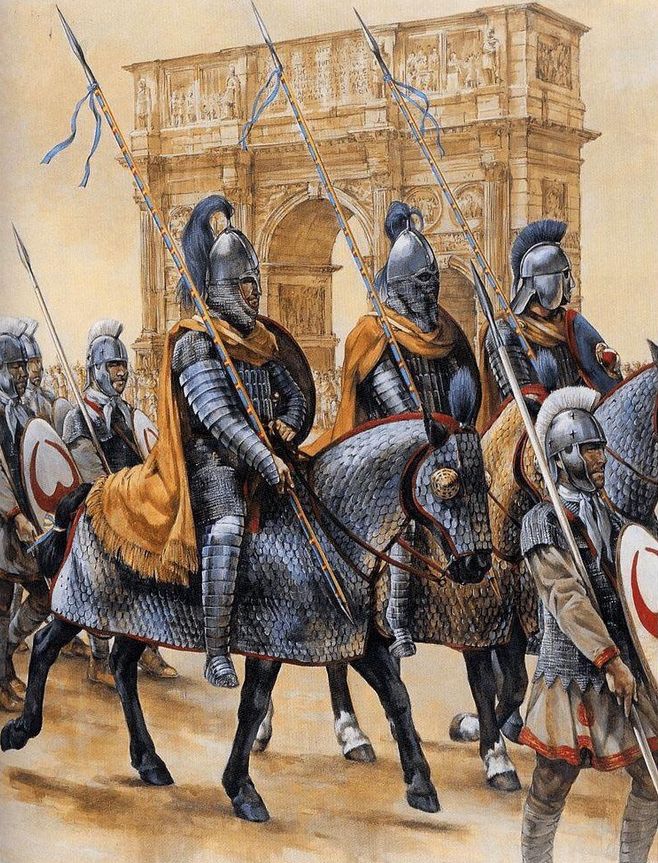
The most impressive feature, on the contrary, of this honest and impartial writer’s outlook upon his own age is a robust faith in the permanence and power of the Roman Empire. This Greek from Antioch is in spirit more Roman than the Romans, so Roman that it is difficult to believe that no Latin blood ran in his veins. His masters in literature are the classical authors of Rome—Cicero, Livy, Virgil, Sallust, Tacitus; and he draws his ideal of human conduct from that older and more simple Roman life which was canonized in the retrospective affection of a luxurious age. Indeed, as we read Ammianus, we are made sensible, at every turn, of the span and impetus of that great body politic which, despite furious batteries from without and more subtle maladies gnawing at the heart, still remained the most impressive monument in the world of force, fortune, and prudence. How could a soldier historian fail to feel the miracle of an Empire which sent its legions to fight on the Tees and the Euphrates, and included within its orbit all the peoples of the Mediterranean world? To a contemporary, the crushing defeat of Julian at Ctesiphon, the immense disaster of the Gothic victory at Adrianople, might well have seemed to be unfavourable episodes, carrying with them no sinister omen of ruin nor seed of mischief beyond repair. For centuries the Romans had fought and absorbed the barbarians; and Ammianus saw little reason to doubt that Rome would continue to fight and absorb barbarians to the end of time.
One other circumstance may help to explain the survival, despite much cause for despondency, of a firm Imperial faith in the spirit of Ammianus. The last and most impressive book of the history is devoted to an account of the Gothic invasion of Thrace, which culminated in the rout of a Roman army and the death of the Emperor Valens. The story of this great calamity is told with sombre force, and loses none of its tragical quality in the hands of Ammianus, who, after working steadily up to the great climax of the battle, ends with two minor but startlingly significant episodes—a Gothic attack upon Constantinople, which was repulsed by a sally of Saracen mercenaries, and the treacherous massacre by order of a Roman governor of a large body of Gothic youths who had been distributed through the cities of Asia Minor. In the light of our later knowledge these ominous passages might seem to be inspired by a profound valedictory emotion, but there is nothing consciously valedictory in the attitude of Ammianus. The history was not composed under the immediate impulse of the disaster of Adrianople, but was begun some ten years later, when the military vigour of Theodosius was asserting itself; so that, writing in a brief oasis of calm when the sky was blue and the sunshine again golden, Ammianus could recount the perils of the past, gravely indeed, but yet without a note of weakness or despair.
Almost all the little that we know of the life of Ammianus is derived from allusions in his own writings. Sprung of noble lineage, he passed early into the ranks of the ‘Protectores Domestici’, a corps d’élite which may be compared to our Guards Brigade, and was soon attached to the person of Ursicinus, a distinguished and experienced soldier who inspired the confidence and admiration of his youthful aide-de-camp. A better opening for an ambitious and enterprising young man, fond of travel, adventure, and companionship, could not have been contrived; and, before Ammianus had reached the age of thirty, he had voyaged on military and official errands from Mesopotamia to Gaul and from Gaul to Mesopotamia, and had tasted the excitements of a siege, a reconnaissance, and a campaign. It is one of our misfortunes that, with a few rare exceptions, he refrains from recounting his personal experiences, and that his impressions of travel, which must have been various and diverting, are sacrificed to the austere tradition of classical history. Nevertheless here and there we descry traces of his activity. He was at Cologne with Ursicinus in 355, and witnessed the downfall of the rebel Silvanus and the beginnings of Julian’s work in Gaul. Two years later he returned to the East, when Roman rule was once more exposed to grave peril from the energy and ambitions of Shapur the Great, the most formidable of the Sassanian kings of Persia. As he recounts this period of his career, Ammianus drops for a moment the impersonal tone which generally marks his history. He describes with some vividness of feeling his own part in the Persian campaign—how he was sent on a mission to the Emir of Corduene, how he took part in the famous defence of Amida (the modern Diarbekr), and joined in that expedition to the Tigris which resulted in Julian’s death and the repulse of the Roman legions at Ctesiphon. After that catastrophe he returned to Antioch and for many years vanishes from history. When he emerges, it is as the spectator of the high-treason trials at Antioch in 371, as the tourist visiting the plain of Adrianople that he may inspect the site still strewn with the whitened bones of Goth and Roman, or finally as the man of letters, recently established in Rome and receiving the compliments of his friend, Libanius, upon a successful course of historical lectures. The sun-browned veteran was, in fact, reading instalments of his magnum opus to the intellectuals of the capital and tasting the sweets of literary fame. We may guess that his last reading was not later than 392.
It has been conjectured, on the ground of his interest in legal affairs, that, after the death of Julian, Ammianus abandoned a military for a civil career, and that the later part of his life was divided between judicial and literary pursuits. Such a development is not impossible, for the ‘Protectores Domestici’ constituted a school of training for civil as well as for military duties. Nor is it easy to suppose that a man of so active a temperament would have retired altogether from public life at so early a point in his course. But there is no direct evidence, and we must be content with surmises. We only know that, resembling the Father of History in curiosity and love of movement, Ammianus travelled widely, visiting Egypt and Greece as well as Thrace, and carrying, as we may conjecture, in his head the exciting design of the great book, the Tacitus brought up to date, which was to be recited before an exacting and distinguished audience in the marble capital of the Empire.
The circumstance that the history was intended for recitation was unfavourable to its quality as a work of art. It is a common experience that lectures, effective enough on first delivery, fail through some lack of subtlety and finish to preserve their power when issued to the world in cold print; and the historical lectures of the Syrian veteran were probably injured for posterity by too close an attention to the recondite tastes of an affected public. Ammianus had a rough but powerful mind, and, what is even more important in an historian, and priceless by reason of its rarity in that age, an essential sincerity and justness of judgement. Unfortunately he thought it necessary to conform himself to a literary fashion which we suspect to have been foreign to his real nature. His narrative is stuffed with turgid declamation and interrupted by long stretches of encyclopaedic learning which a modern author would omit or at least consign to foot-notes or appendices. He breaks off to describe a prodigy, an omen, a cause célèbre, in order that out of the studied variety of his matter he may provide a stimulus appropriate to the varying appetites of his audience. Probably, if he had taken literature less seriously, he would have written better, for he is capable, when off his guard, of a simple and soldierly narrative. But, though modest as to his own attainments, he cherished a secret flame of literary ambition. He read furiously. He soaked himself in Livy and Cicero and Virgil, in geographical and scientific handbooks, as well as in the proper and authentic sources for an historical narrative; and he succeeded in manufacturing a declamatory style of which we can say nothing more charitable than that accurate statements and moderate judgements have seldom been presented in a vesture so artificial and inappropriate.
If we had to single out the special excellence which marks Ammianus as a writer of history, we should find it in his distinct gift for life-like portraiture. He has provided us with a series of personal sketches than which of their kind there is nothing better in ancient literature; for the ‘Lives’ of Plutarch, incomparably more beautiful and attractive, do not come up for comparison, belonging as they do to the category of idealistic literature, whereas the work of Ammianus is founded upon a close and dispassionate study of mixed character. Historians are largely creatures of tradition; and the portraits of Ammianus may have owed something to a gossipy book, then greatly in vogue but now only surviving in a few scanty fragments, the satirical ‘Lives of the Emperors’ by Marius Maximus. In any case, it is reasonable to infer from the success which Ammianus achieves in a most difficult branch of the historian’s art that the study of human character was one of the few departments of intellectual inquiry in which considerable progress had been made in the later years of the Roman Empire. Unfortunately the faculty of discerning portraiture was lost as soon as it had reached a point of distinguished excellence in the careful workmanship of Ammianus. The great calamities of the succeeding generation afforded no leisure for that habit of minute and engaging causticity which flourishes in sheltered and critical communities and is nourished by the drama, the satire, and the novel. For eight centuries no greater actor in the stage of European history is so well depicted for posterity as are the Constantius, the Julian, and the Valentinian of Ammianus. Nor was the full spirit of penetrating psychology recaptured for Europe until the Renaissance of the sixteenth century.
History having to do with the business of the State, it is certainly no disqualification in a writer of history that he should have some real working knowledge of one of the great public callings. Ammianus approached history from the angle of a soldier, and his work is a repository of military information. He is, indeed, our principal authority upon the art of war in the fourth century, and has left us some careful descriptions, more appropriate to a dictionary than to an historical narrative, of the poliorcetic engines of his time. Nevertheless we cannot regard him as a good military historian, and that for a reason which may seem curious, in view of the large space which he allots to geographical surveys. He never seems to understand, or rather he never enables his reader to understand, the strategy of a campaign. He seems to put his geography in one department and his military history in another, and never to bring them into fruitful connexion. A siege he will often describe with intelligent particularity, but his battle-pieces are confused, his campaigns sketchy and imperfectly grounded; and it is curious to note that, though he records failure after failure, his work is not greatly distinguished for strategical commentary or criticism. Poliorcetics, however, he thoroughly understands; and the serious interest in practical things, which makes him a master of this branch of military science and betrays itself in a great range and variety of technical disquisitions in other spheres of knowledge, is only part of that masculine sanity of character which constitutes his principal force and attraction. It is not to be claimed for Ammianus that he never talks nonsense. He talks a deal of nonsense. He believes in omens and prodigies, and delights in describing them to an audience which did not think the worse of a popular lecture for an admixture of the sensational and the ghostly. But the general balance of his judgement was undisturbed by such concessions to vulgar superstition. His mind was essentially strong and secular, averse from all religious extravagance and as far removed from the exalted temper of the sects as the first Lord Shaftesbury from the Cameronians. In one passage he condemns his master, Julian, for the intemperance of his paganism, in another he applauds Valentinian for his policy of religious toleration—verdicts not to be explained on Epicurean grounds, but as the considered expression of that moderate and reasonable spirit which formed part of the Greek ideal of virtue. It is therefore possible from a study of Ammianus to derive a notion of the best secular moral standard which prevailed among cultivated pagans of the Roman Empire in the later part of the fourth century.
That standard was by no means low. The conscience of the soldier-historian was revolted by idleness and profligacy, cruelty and intemperance, trickery and injustice. In the main, our virtues and vices were his virtues and vices also. He had sources of moral sustenance which are not ours, but which may not have been inferior in potency to any that modern civilization brings to bear on a character analogous to his. He was inspired by the great classical authors of Greece and Rome, and especially by Cicero, whose writings formed the Bible of humane wisdom as long as the humanities retained their value in the Western world. He had the strong Roman respect for the reign of law, coupled with a hearty detestation of that capricious Asiatic cruelty which, in his own time, had begun to debase the administration of Justice. Life in the army had given him a code of honour which is certainly not inferior to that which now regulates the conduct of some modern armies professedly Christian. Finally, he was moved by a deep sentiment of devotion to the Empire as a providential system for the governance of the world.
War is the supreme touchstone of ethical principle. Ammianus recounts, without adverse comment, the pitiless massacre of women and children in the barbarous fighting of the frontier wars. When a Roman general, after making a truce with a marauding band of Saxons, contrives for them an ambush so that they perish to a man, he observes that a just judge would condemn the act as perfidious and disgraceful, but that reflection would show that it was not improper to destroy a dangerous band of robbers when occasion offered. To assign such sentiments to paganism is to ignore some very recent passages in the history of European morals. A Berlin pastor recently wrote in the Vossische Zeitung: ‘Do you think it contrary to Christianity for our soldiers to shoot down these vermin, the Belgian and French assassins, men, women and children, and to lay their houses in dust and ashes?’ and answered his question in the negative. Ammianus was ignorant enough to suppose that Christianity exhorted men to eschew all courses save the straight way of justice and clemency; but then he did not pretend to be a Christian. His philosophy of war was that of the German War Book, tempered by an honourable dislike for treachery of all sorts; and, if he thought that extreme danger might justify anything, he is no worse than the great majority of men have always been.
A true estimate of our historian’s moral quality can be more certainly reached through a consideration of his attitude upon the great topic of civil justice. War is at best a barbarous thing; and the wars of the fourth century, being conducted by barbarous armies on both sides, were not calculated to foster a code of clemency. If Ammianus, living through an age during which the Empire was fighting for its life, is not always too scrupulous, we may make allowances for any hardness of tone which we detect in him. But the break-down in the administration of Imperial Justice moves him to righteous passion. His own city of Antioch was the scene of two frightful persecutions, one under the beautiful young tyrant Gallus, and the other under the insanely cruel and suspicious Valens. Innocent men were tortured to death by the score. Delation flourished; the forms of justice were flouted; no one felt secure. The later of these two persecutions touched Ammianus very nearly. He was himself witness of many of the terrible scenes which were enacted in the law-court, the prison, or the amphitheatre. He heard the creaking of the instruments of torture, the cries of the victims, the hoarse and cruel ejaculations of the executioner. Some of his own friends were among the innocents who perished. One particular case branded itself upon his memory as, above all others, calling for vengeance. The young philosopher, Simonides, whose grave and stoical reticence had exasperated the savage mind of the Emperor, was burned alive. ‘He quitted life as if it were a mad mistress, smiled at the sudden ruin of the passing moments and died without a quiver.’ Simonides was executed in private. The mass of innocent conspirators were murdered in the amphitheatre at Antioch amid the loud wails of the spectators. And so far did the campaign of incrimination proceed that in the eastern province people burnt their libraries for fear that the possession of some treatise or other might furnish ground for a criminal charge.
The sombre story of these judicial murders closes with an eloquent apostrophe to the spirit of humane wisdom which shines through the classical literature of Greece and Rome:
‘O glorious wisdom, gift of heaven to happy mortals, who hast often refined their corrupt natures, how many evils wouldst thou have corrected in these dark times, had it been vouchsafed to Valens to learn through thee that Empire is nothing else, in the opinion of the wise, but care for the well-being of others! If only he had learnt that it was the part of a good governor to restrain his power, to resist insatiate cupidity and implacable passions, and to know that, in the words of Cicero, the recollection of cruelty makes a miserable old age! Therefore it behoves every one who is about to pass sentence upon the life and spirit of man, who is a part of the world and makes up the complement of living things, to deliberate long and carefully and to resist headlong impulses, for the deed once done cannot be recalled.’
The stress laid upon the sanctity of human life as part of the animate universe is very remarkable.
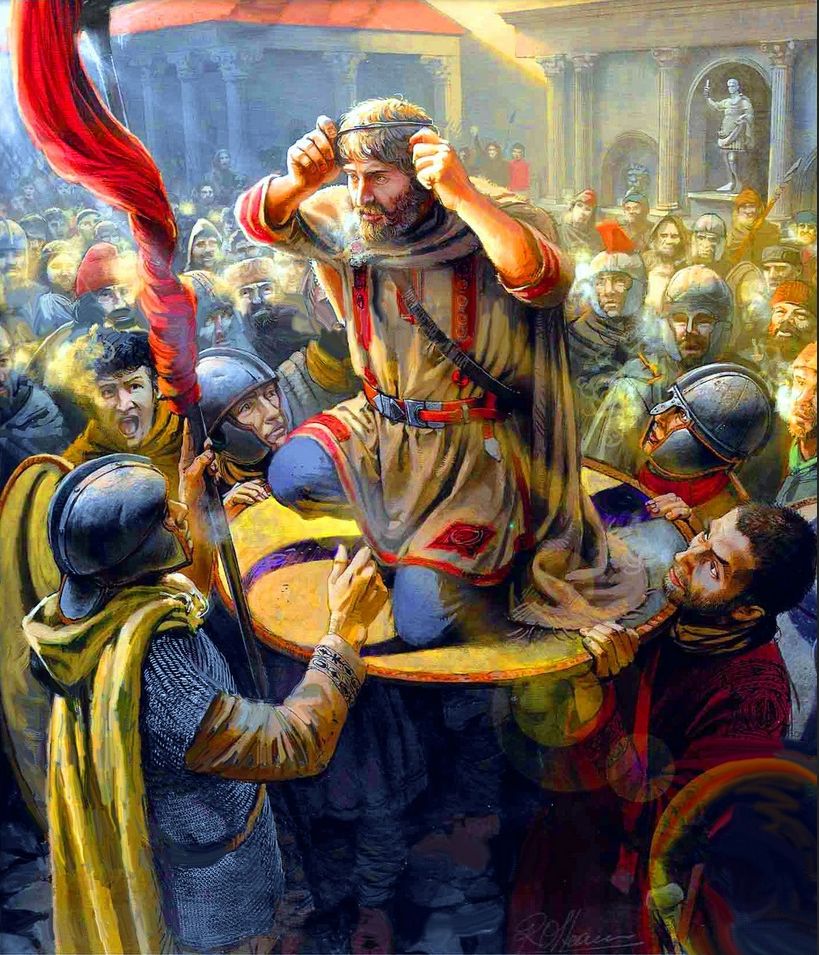
We suspect, though we cannot bring our suspicions to the proof, that the example of his master, Julian, exercised a deep and enduring influence over the character of Ammianus. Julian was just the kind of man to inspire enthusiasm in a young soldier of sound moral instincts and intellectual aspirations. His frame was strong, and athletic, his eyes remarkable for beauty and intelligence, his temperament of that sanguine and impetuous type which specially appeals to young men. When in later life Ammianus comes to compose the full-length portrait of the ‘Apostate’, the first trait which strikes him is the heroic air of the sitter. The Emperor was no ordinary man. He was to be classed with the heroes—‘vir profecto heroicis connumerandus ingeniis’—having that indifference for the comforts and luxuries of life which, combined with high courage, brilliant energy, and moral ardour, strikes the mind with an ineffaceable impression of greatness. The pursuit of philosophy, though it may give lustre to the soul, does not always improve the manners of the student. But it is very clear that Julian was attractive. His retentive memory, his eager excitable interest in the great things of literature and philosophy, his copious and fluent gift of conversation, must have made him a stimulating and perhaps even a fatiguing companion. The philosopher Julian was very unlike the philosopher Kant or the philosopher Frederick the Great. Of that patient, plodding, exploring faculty which goes to the making of metaphysical systems, he was completely innocent. He was, in fact, no more of a philosopher than Napoleon, and no more of a cynic than Carlyle. The principal characteristic of his temperament was a glowing impetuosity. He did everything with a rush and practically nothing on system. He would neglect food or sleep for an interesting book or a metaphysical disquisition, and in disputation would be as careless of his dignity as in battle he was reckless of his life. If we are to judge from his writings, most of them dashed off at white heat, he possessed that rare power of giving complete expression to mind and temperament which is the sure mark of literary genius. Now a man of this rushing quality, without reticence or reserve, makes mistakes and easily exposes himself to ridicule, but he is apt to be attractive, as the secretive, cunning, balancing intellect can never hope to be. What is singular, however, is to find this kind of temperament united to a very high measure of practical competence, for Julian was an excellent soldier, expert in every branch of the military art. Ammianus, who speaks with authority upon such points, commends his command of the principles of siege warfare, his skill in the selection of healthy spots for camps, his tactical versatility in battle, his signal power over his troops, and the sage principles on which his outposts and defences were managed. And there can be no doubt that these soldierly aptitudes secured an additional measure of respect for qualities which are not commonly met with in the camp.
Among these qualities, Ammianus must have been principally affected by Julian’s passionate enthusiasm for the ancient culture. An official patronage of letters is one of the most depressing stocks-in-trade of monarchs; but Julian’s attitude towards literature was neither official nor patronizing. It is indeed one of the charms of this singular character, that he preserved upon the throne all the disinterested reverence for learning of the genuine student. His court and camp were thronged by philosophers; and he spent the last moments of his life discussing the mysteries of the soul with two learned experts—father-confessors they may perhaps be called—who had been drawn in his train to the distant waters of the Tigris. Such enthusiasm, coming from so exalted a quarter, can hardly have failed to kindle a flame of emulation among minds susceptible of culture, the more so when we try to conjure up the quality of Julian’s talk (and this may be naturally inferred from his writings), with its rich and easy command of literary allusion, its speed and vehemence, and above all its perpetual concern with the loftiest interests of mankind.
On the first contact with a remarkable man we often exaggerate both his positive and relative magnitude. We feel the enchantment of genius. We are excited by the glow of a strong character, and we do not stop to measure or compare. But, if this was so with Ammianus in his original estimate of Julian, it cannot be said that a cool and true perspective is lacking to the deliberate judgement of his later life. The truth is that an important side of Julian’s character was alien, if not unsympathetic, to the lay intelligence of Ammianus. Though the Emperor had abandoned Christianity, religion was still the primary interest of his life. He conceived,it to be his mission to oppose to Christianity a State religion compounded of the old creeds of the pagan world but animated by a new and more fervent spirit. In this campaign, which was conducted with desperate energy, Julian received inspiration with equal impartiality, from the poets and thinkers of ancient Greece, from the mystical doctors of Neo-platonic philosophy as well as from vulgar quacks and thaumaturgists; and his theology was a vessel into which every liquid, good, bad, and indifferent, had been indiscriminately poured. The centre of his system was the worship of the sun-god, who was regarded as the supreme embodiment of the energy, spirit, and intellect by which the Universe is ruled. Monotheism was in the air; and Julian, who was sensitive to the spiritual currents of his time, acknowledges the force of its appeal. But the gods of the ancient mythology were not to be dispossessed by an Oriental intruder; and place was found in the new system for the traditional polytheism of Greece, Rome, and the Nearer East.
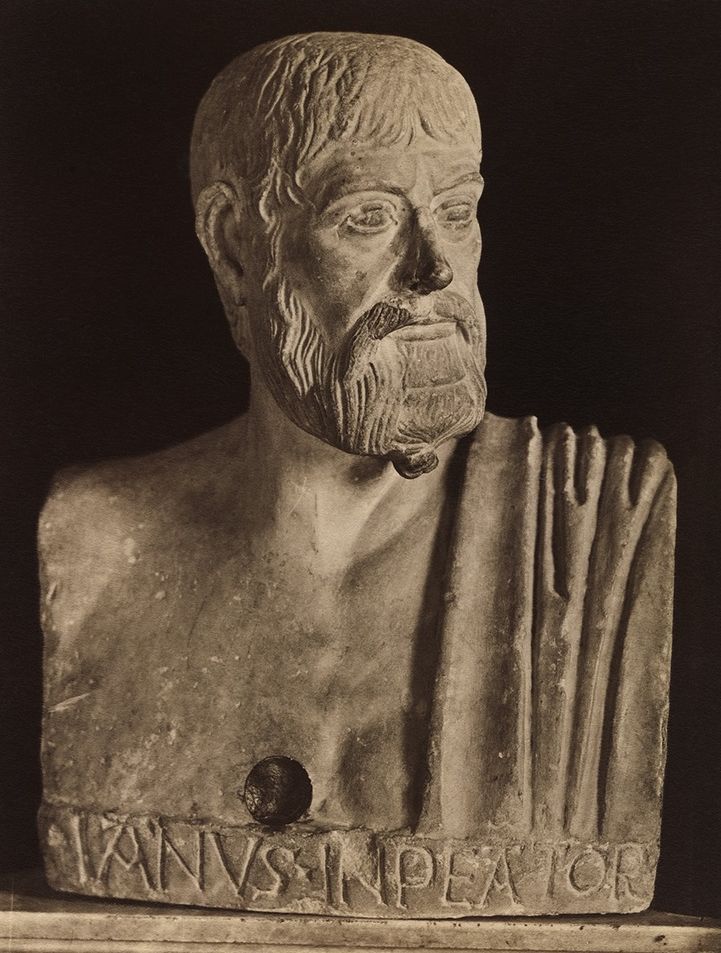
All this religious side of Julian’s activity was indifferent, if not distasteful, to Ammianus. He was by nature a politique, with an ingrained distrust of ecstasy and enthusiasm; and it is like his Roman love of reserve to single out among the defects of Julian’s character his volubility and not infrequent converse with persons of low degree, and to comment with some asperity upon the extremes of his sacrificial zeal. So, although he makes a hero of Julian, he is discriminating in praise and does not try to slur over defects. He comments, for instance, unfavourably upon his habit of asking litigants to what religion they belonged, and denounces in the strongest terms the cruel edict which forbade Christian masters of rhetoric and grammar to teach in the schools. In general it may be said that his portrait is fully substantiated by Julian’s written remains, and that this singular body of literature affords the best proof of the discernment which Ammianus brought to bear upon the characters of his history. We read the letters, the orations, and the satires, and then return to Ammianus to find that the strength and weakness of the writer’s curious and attractive temperament have been duly noted. Perhaps a modern historian would see more to admire in the religious nature of this Crusader against the Cross and less in his military achievements. But in essential points, there will be no disagreement from this, one of the most remarkable studies of character in the whole range of history.
But, however highly we may be disposed to rate the gift of personal portraiture, it is not the principal treasure of the historical mind. A series of cameos, be they as delicate and true as you will, does not, of itself, constitute a history. We ask for more—for nothing less than the intelligent interpretation of a vanished age, so that we may understand not only the motives of the leading actors on the stage, but the general tendencies of the time, the essential springs of change, the elements of strength and weakness, of progress, recuperation or decay, which may be inferred from the recital of political transactions or from the analysis of the social and economic fabric, and above all so that we may form a just view of the political and social problems of the age. In the highest sense of the term, Ammianus is no philosophic historian. He has neither the moral depth nor the intellectual grasp which is necessary to the grand style in history; and, if we were compelled solely to rely upon his evidence for our knowledge of the life of the Romans during the later half of the fourth century, some essential elements would be wanting to the picture. But at least it may be said that he enables us to realize, through his own vivid feeling of their importance, two contrasted and portentous facts, the power of the barbarian world and the decay of Roman society. His graphic and vigorous sketches of the Isaurians, the Persians, the Saracens, and the Huns, his admirable story of the Gothic invasion of Thrace and of the terrific fighting at Adrianople—where Rome experienced a defeat more crushing than any since Cannae—the care with which he enumerates and characterizes the barbarian tribes who were pressing everywhere upon the Roman defences, and more particularly the attention which he devotes to the various manifestations of the military art to be found among the antagonists of the Empire—all this side of his work was not only relevant to immediate political needs, but has an enduring importance as throwing light upon one of the greatest changes in recorded history.
We are always a little distrustful of the critic who denounces the decadence of his contemporaries, for every generation can be shown to be corrupt on a careful selection of the facts, and every society takes a morbid pleasure in the recital of its own manifest degeneracy. It is not surprising that a veteran from the provinces, trained at the ascetic court of Julian, should have found much to reprehend in Roman society. And, as Juvenal was still one of the most popular authors of the day, we may well imagine that a lecture on contemporary history would gain vogue through a spice of moral denunciation. But the real strength of the indictment of Ammianus does not consist so much in his portrayal of the profligate manners of the Roman people as in the crushing evidence which he adduces of a general infection of cruelty, incompetence, and disorder, poisoning the whole body politic of the Empire. The strongest Roman fortress on the Tigris was sacrificed through a palace intrigue directed against Ursicinus, the ablest commander in the East. And such an incident does not stand alone. When the armies of the Goths were pouring over the Balkan Peninsula ‘like the lava of Mount Etna’, the generals selected to oppose them were not only ignorant and rash, but actually sacrificed an important military advantage in order that they might traffic in slaves with the enemy. But perhaps the most signal evidence of the disease in the body politic is supplied by the conduct of the emperors themselves. Constantius was in some ways above the average level of conduct. He was chaste, temperate, laborious, a diligent cultivator of learning and scrupulous in his distribution of patronage. But his tyranny was terrific. The faintest suspicion—and the atmosphere of his Court was poisoned by the breath of traducers—was enough to set in motion the machinery of the most awful persecution. The same evil mania, resulting in the same wild orgy of Asiatic cruelty, afflicted the sluggish and illiterate Valens. Even the better emperors interfered with the course of justice, and were assailed by the voices of intriguers who wished to use the machinery of government for plunder or revenge. And the most sinister feature in this sombre story of panic and savage violence is that the voice of protest is silent. There are epigrams, there are bread-riots and wine-riots and military revolts, but there are no organs of liberty. The Senate of Rome is a powerless shadow. There are no parties formed on a common basis of political principles. The civilized world is governed by an Oriental tyranny.
‘We might censure the vices of his style, the disorder and perplexity of his narrative; but we must now take leave of this impartial historian, and reproach is silenced by our regret for such an irreparable loss.’ So does Gibbon wave his stately adieu to ‘the accurate and faithful guide’, whose steps he has followed with punctuality, sarcasm, and profit. The records of the Roman Empire are lamentably imperfect; and one of the most curious features in literary history is the complete disappearance of a series of autobiographies written by some of the most famous of the emperors. What would we not give for the memoirs of Augustus and Vespasian, for the autobiographies of Hadrian and Severus, or the Commentaries of Constantine? They have perished; and no fragment has been quoted sufficiently substantial to enable us to estimate our loss. For centuries, too, the work of Ammianus was lost to Europe; and it was not until Poggio’s discovery of the Hersfeld manuscript that this invaluable writer was restored to European scholarship.
The fifteenth century was a Ciceronian age; and in the circle of Italian purists the solecisms of the Syrian veteran were felt to stand in need of apology. The editio princeps by Sabinus (Rome, 1494) is prefaced by a letter to the Bishop of Bergamo, in which the editor craves that his author may not be entirely condemned for his use of the Latin word for ‘deacon’. We do not know whether the Bishop was able to condone so grave a departure from classical usage. But to the modern eye it is one of the chief merits of this honest writer that his Latinity is not too pure, that it bears traces of the mingling of Greek, Latin, and Christian elements, and that it reflects with care and fidelity the conditions and transactions of the age in which he lived.
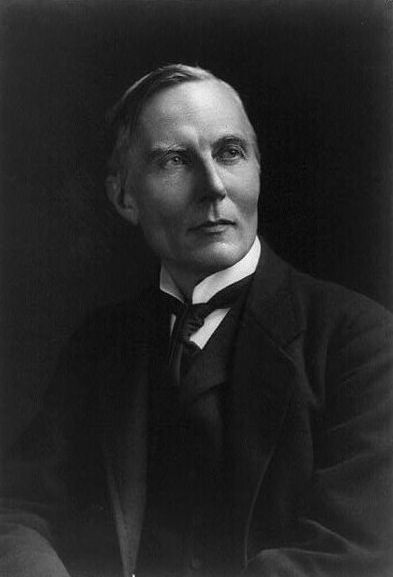
(1865-1940)

